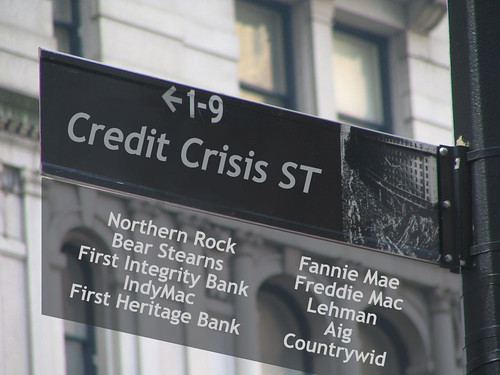Let’s imagine there’s a world with 1 million people (easy numbers for my poor maths).
Each person has £1000 in savings and is paid £100 per annum to work for one of 100 companies. (You could make it more realistic, but the maths, the maths!)
Ten of those companies are banks.
So…
Each company employs 10,000 people (including the bosses) and pays out £1m in wages. So has to make at least £1m a year to keep going.
It makes things that the 1 million people buy…with their £1000 savings and/or their £100 wages.
Ten companies look after all this money. £1000m in savings and £1m in current (checking) accounts. They have to take out of the system £1m to pay their staff, but of course each £100 goes into other companies – like supermarkets, car dealers etc and then ends up back in one of the ten banks.
I don’t speculate on the value of the companies – there is only so much money to go around so it’s irrelevant.
Some companies will be good at bringing in money and others will go short. The former will bank the money (or spend it) and it will still end up in a bank. Where the latter kind of company might ask to borrow it.
If they end up not being able to pay it back, they’ll go bust. But the money will still be in the system.
So, my question is this, how do they screw up?
Explanations for the hard of thinking, welcome. And feel free to elaborate on my model.
Thursday, 9 October 2008
You'd never know I studied economics once
Subscribe to:
Post Comments (Atom)





Hmmm the model started well enough, but if you studied economics you know that nothing is that simple - can you remember the formula for 'demand'? (look it up).
ReplyDeleteTo use your platform then, one of the 100 companies was selling 100% mortgages in a declining house market to simple people that would not be able to afford to pay their mortgage. They paid $100,000 for their houses (they are American..) and when they default on their mortgages, their houses are worth $50,000 (oh ooohhh...).In the meantime the idiots at one of your 10 banks have 'bought' the mortgages from the brokers for $100,000 (you can in theory make a lot of money on a mortgage) - the bankers were too stupid to know what they had bought so adamant they were to invest invest invest. Their investment (depositors money) is now worth half what it was...that's not good news, the operating fund of the bank is gone, hence there is less credit to lend to anyone - hence the credit crunch - Does that help?
Check out TheCreditCruncher.com for more...